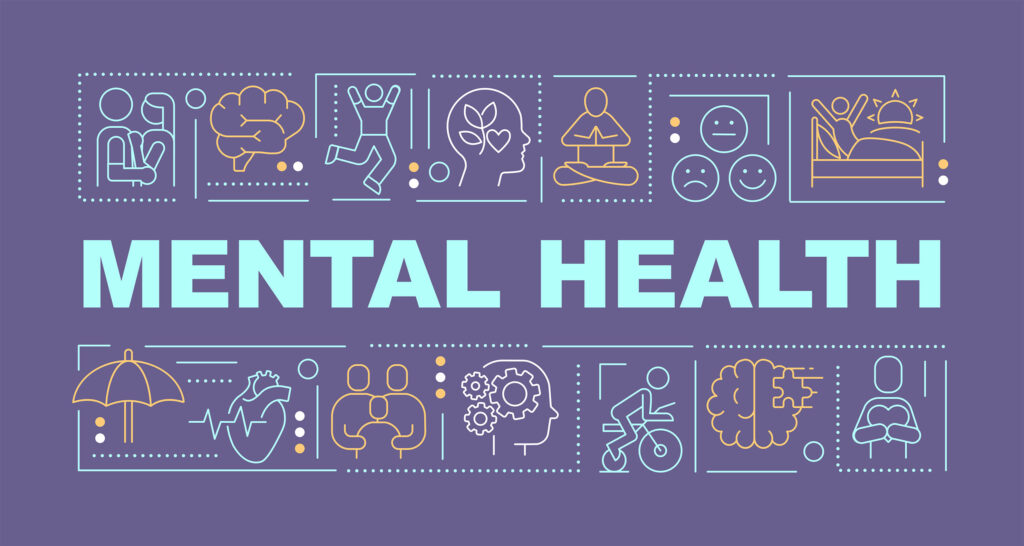The Relevance of Mental Health And Wellness: a Deep Dive Into Counseling, Therapy, and Their Benefits
Psychological health significantly shapes specific wellness, affecting emotions, ideas, and habits. Counseling and therapy function as essential opportunities for healing and personal development. They provide organized assistance, aiding people navigate life's obstacles. Yet, lots of stay not aware of the specific kinds of treatment offered and their distinct benefits. Understanding these aspects is necessary for any individual thinking about professional mental health assistance. What adheres to might brighten paths to resilience and satisfaction that several ignore.
Understanding Mental Wellness and Its Influence
Mental health is frequently overlooked, it plays an important function in overall wellness and day-to-day performance - Couples Therapy. It includes psychological, psychological, and social elements that affect how individuals assume, really feel, and act. A person's psychological health and wellness directly affects their ability to deal with anxiety, relate to others, and choose. Poor psychological health can cause various issues, consisting of anxiousness, depression, and difficulty in maintaining relationships, all of which can hinder specialist and personal growth.Furthermore, psychological health has significant ramifications for physical wellness. Persistent anxiety and untreated psychological conditions can contribute to various physical conditions, such as heart disease and damaged immune reactions. Conversely, positive psychological health promotes strength, allowing people to deal with life's challenges successfully. Comprehending psychological wellness's relevance is vital for fostering supportive settings that advertise psychological wellness, thereby improving the top quality of life for individuals and neighborhoods alike
The Different Kinds Of Counseling and Therapy
In the domain name of mental wellness, various counseling and therapy types accommodate diverse demands. Individual counseling strategies concentrate on personal concerns with individually sessions, while team therapy dynamics foster shared experiences and assistance amongst participants. Comprehending these modalities is important for selecting the ideal intervention for different difficulties.
Private Counseling Strategies
Various specific therapy techniques exist, each created to resolve certain psychological wellness concerns and satisfy varying client demands. Cognitive Behavior Modification (CBT) concentrates on determining and transforming unfavorable thought patterns, while Psychodynamic Therapy discovers unconscious processes and past experiences. Humanistic Therapy emphasizes individual development and self-actualization, fostering a supportive atmosphere. Interpersonal Therapy (IPT) targets relationship problems and interaction patterns to improve psychological well-being. Additionally, Acceptance and Dedication Therapy (ACT) motivates customers to accept their ideas and feelings while dedicating to individual worths. Each strategy provides distinct techniques and ideologies, permitting professionals to customize their techniques to the individual, therefore enhancing the healing experience and promoting psychological health and wellness recovery.
Group Treatment Dynamics
Group treatment characteristics incorporate numerous restorative strategies that utilize the power of shared experiences and social connections. This kind of treatment frequently consists of diverse groups, promoting a safe atmosphere for participants to share sensations and ideas. Key kinds of group therapy consist of support system, which give psychological assistance; process-oriented teams, concentrating on interpersonal communications; and psychoeducational groups, focused on imparting expertise regarding psychological health and wellness problems. The characteristics within these groups can enhance self-awareness, as members often review their behaviors in regard to others. Additionally, group treatment fosters a feeling of belonging, minimizing sensations of isolation. Via shared stories and cumulative problem-solving, participants can establish coping techniques and get understandings, eventually adding to private development and recovery.
The Role of Counseling in Mental Wellness
Counseling plays a necessary duty in psychological health by using numerous strategies customized to specific demands. These methods offer specialist advice that can cause substantial improvements in psychological health. Recognizing the different sorts of counseling can aid people make informed choices regarding their mental healthcare.

Sorts Of Therapy Techniques
While various counseling techniques exist, each deals special methods and understandings into mental health therapy - Marriage Counselling. Amongst one of the most popular are cognitive-behavioral therapy (CBT), which concentrates on altering adverse thought patterns; psychodynamic therapy, which explores subconscious procedures and childhood years experiences; and humanistic techniques, stressing personal development and self-actualization. In addition, solution-focused short therapy prioritizes locating remedies in the present instead of delving into troubles. Team treatment fosters community and shared experiences, while family treatment addresses relational dynamics within familial frameworks. Each technique caters to different requirements, straightening with individual preferences, problems, and healing goals. Understanding these approaches assists customers make educated options concerning their psychological wellness trip and promotes reliable treatment tailored to their special circumstances
Advantages of Professional Support
Numerous people benefit from specialist advice in handling their mental wellness challenges. Therapy offers a secure room for customers to explore their thoughts and feelings without judgment. This restorative environment cultivates self-awareness, enabling people to recognize patterns in their behavior and develop healthier coping techniques. Specialist support also provides accessibility to evidence-based strategies that can minimize symptoms of anxiety, depression, and other mental wellness problems. Additionally, therapists can help in setting reasonable objectives and offer support in attaining them, improving overall well-being. The joint connection in between therapist and customer is crucial, as it promotes liability and motivates individual development. Inevitably, professional advice plays an essential function in steering mental health and wellness trips, bring about improved psychological strength and life contentment.
Benefits of Therapy: Recovery and Growth
:max_bytes(150000):strip_icc()/VWH-MichelaButtignolCounselingFor-MentalHealth-4000x2700-35491a98e57746399614c4ef7f3833a1.png)
How to Pick the Right Therapist or Counselor
Exactly how can one navigate the typically frustrating procedure of choosing the best therapist or counselor? Recognizing individual requirements is vital; people ought to consider their certain issues, whether clinical depression, relationship, or anxiety challenges. It is helpful to research Click Here numerous therapeutic techniques, such as cognitive-behavioral therapy or psychodynamic therapy, to discover an ideal match.Next, potential customers should seek recommendations from relied on resources or utilize on the internet directories. It is critical to examine specialists' credentials, including their education, licensing, and areas of specialization. Scheduling preliminary assessments can assist determine compatibility, enabling individuals to examine communication designs and personal comfort.Finally, logistical variables, such as area, availability, and charges, ought to likewise be taken into consideration. By attentively weighing these components, one can make an educated choice, eventually cultivating a healing partnership that sustains mental health and wellness and individual growth.
Getting Over Preconception: Welcoming Mental Wellness Support
While social mindsets toward psychological wellness have advanced, preconception still offers a considerable barrier for many looking for assistance. This preconception usually manifests as false impressions bordering mental disorder, leading individuals to feel shame or anxiety regarding their battles. Many individuals are reluctant to seek therapy or therapy because of stress over being judged or classified. Conquering this stigma is basic for cultivating an encouraging environment where individuals can honestly discuss their mental wellness needs.Communities and organizations play an important role in this makeover by promoting recognition and education and learning concerning psychological wellness concerns. Campaigns that highlight individual stories can humanize these experiences, urging others to look for aid without worry. As approval grows, individuals may feel much more equipped to welcome mental wellness support, recognizing it as a necessary aspect of total health. By taking down stigma, culture can cultivate a society of understanding, empathy, and proactive psychological health and wellness treatment.
Strategies for Maintaining Mental Wellness Outside of Treatment
Therapy gives valuable assistance, preserving mental well-being outside of sessions is just as crucial. People can implement numerous strategies to maintain their psychological health. Routine exercise plays a necessary role, as exercise promotes the launch of endorphins, which boost mood. In addition, a balanced diet plan rich in nutrients can substantially affect emotional stability and energy levels.Practicing mindfulness and reflection helps people manage anxiety and establish better self-awareness. Establishing a consistent rest routine is also essential, as top quality remainder is critical for cognitive function and emotional Resources regulation.Engaging in social tasks promotes connection and minimizes feelings of isolation. Pursuing leisure activities or interests can offer an imaginative electrical outlet and increase self-confidence. Finally, establishing realistic goals and practicing self-compassion allows people to grow strength. By integrating these approaches right into life, people can efficiently support their psychological well-being beyond treatment sessions.
Often Asked Inquiries

Just How Can I Tell if I Required Treatment?

Identifying the need for therapy commonly entails acknowledging relentless sensations of despair, stress and anxiety, or overwhelming tension. If day-to-day working ends up being difficult or coping mechanisms stop working, looking for professional support may be a valuable advance.
What Should I Expect in My Initial Therapy Session?
In the first treatment session, individuals can expect an intro, discussion of their reasons for looking for help, and a review of the specialist's technique, developing a foundation for future conversations and establishing convenience in the therapeutic room.
Are Online Therapy Procedure as Effective as In-Person Ones?
Study indicates that online therapy sessions can be as effective as in-person ones. Factors such as the therapist's qualifications, customer involvement, and the therapeutic partnership considerably influence outcomes, regardless of the tool made use of.
Can Treatment Aid With Connection Problems?
Therapy can assist people in dealing with relationship problems by giving tools for communication, comprehending emotions, and settling conflicts. Couples Therapy. It advertises healthier characteristics and urges personal growth, eventually cultivating more powerful, much more satisfying links in between companions
How Much Time Does Therapy Generally Last?
Treatment duration varies significantly based on individual requirements and objectives. Typically, sessions may last from a few weeks to numerous months, with some individuals participating in recurring therapy to resolve lasting concerns and individual development. Cognitive Behavioral Treatment (CBT) focuses on identifying and changing adverse thought patterns, while Psychodynamic Therapy checks out previous experiences and unconscious procedures. Trick kinds of team treatment include support groups, which supply psychological support; process-oriented teams, concentrating on social interactions; and psychoeducational groups, intended at presenting understanding concerning mental health issues. Among the most popular are cognitive-behavioral therapy (CBT), which concentrates on altering unfavorable thought patterns; psychodynamic treatment, which discovers unconscious processes and childhood experiences; and humanistic approaches, emphasizing individual development and self-actualization. Group therapy promotes area and shared experiences, while family members treatment addresses relational dynamics within domestic structures. It is useful to research study different healing techniques, such as cognitive-behavioral therapy or psychodynamic treatment, to locate a suitable match.Next, prospective clients ought to look for referrals web from relied on resources or make use of on-line directory sites.